SML3893
LCL521 dihydrochlroide

≥95% (HPLC)
Synonym(s):
(1R,2R)-2-N-(Tetradecanoylamino)-1-(40-nitrophenyl)-propyl-1,3-O,O-di-(N,N-dimethylamino) acetate dihydrochloride, 1,3-DMG-B13, 1,3-O,O-DMG-B13•2HCl, 1,3-di-DMG-B13, B13: (1R,2R)-2-(tetradecanoylamino)-1-(4′-nitrophenyl)-1,3-propandiol), LCL 521, LCL-521
About This Item
Recommended Products
Quality Level
Assay
≥95% (HPLC)
form
powder
storage condition
desiccated
color
white to beige
solubility
DMSO: 2 mg/mL, clear
storage temp.
-10 to -25°C
SMILES string
CN(C)CC(O[C@H](C1=CC=C(C=C1)[N+]([O-])=O)[C@@H](COC(CN(C)C)=O)NC(CCCCCCCCCCCCC)=O)=O.[2HCl]
Biochem/physiol Actions
LCL521 is the N,N-dimethyl glycine (DMG) diester prodrug form of the selective acid ceramidase (ACDase) inhibitor B13 (no inhibition against NCDase/ASAH2 or AlkCDase/ACER2). The DMG enables efficient and targeted B13 lysosomal delivery, resulting in enhanced cellular ACDase inhibitory potency (by 70% vs 12% in MCF7, respectively, post 1h treatment by 1 μM LCL521 or 10 μM B13) and effective blockage of ceramide (Cer) to sphingosine (Sph) processing (80% vs 0% Sph level drop in MCF7, respectively, post 1h treatment by 1 μM LCL521 or 10 μM B13).
Caution
Storage Class Code
11 - Combustible Solids
WGK
WGK 3
Flash Point(F)
Not applicable
Flash Point(C)
Not applicable
Certificates of Analysis (COA)
Search for Certificates of Analysis (COA) by entering the products Lot/Batch Number. Lot and Batch Numbers can be found on a product’s label following the words ‘Lot’ or ‘Batch’.
Already Own This Product?
Find documentation for the products that you have recently purchased in the Document Library.
Our team of scientists has experience in all areas of research including Life Science, Material Science, Chemical Synthesis, Chromatography, Analytical and many others.
Contact Technical Service








